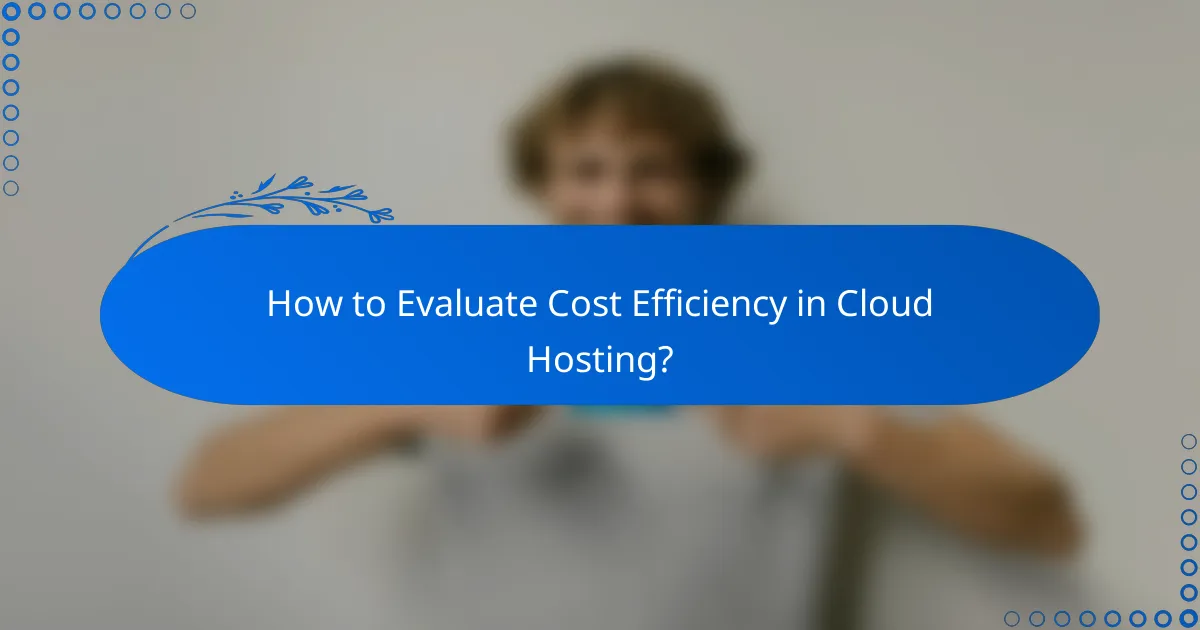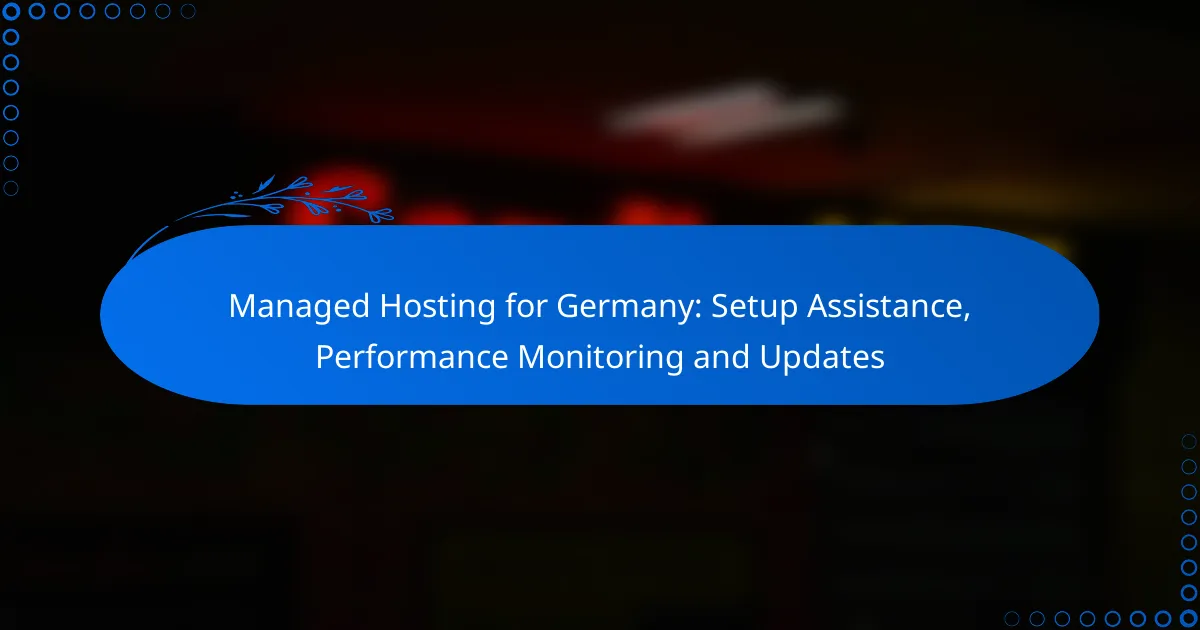Cloud hosting in Germany offers businesses unparalleled scalability, robust security, and cost efficiency. With top providers like AWS and Microsoft Azure, companies can tailor solutions to meet their specific needs. Key considerations include compliance with GDPR, performance metrics, and customer support, ensuring a secure and efficient hosting environment.

What Are the Best Cloud Hosting Solutions for Germany?
Germany provides a wide range of cloud hosting solutions tailored to diverse business needs, with leading providers like AWS, Google Cloud, Microsoft Azure, OVHcloud, and 1&1 IONOS. Each platform offers distinctive features that enhance scalability, security, and cost efficiency, making them suitable for businesses of all sizes.
When choosing a cloud hosting solution, businesses must weigh critical factors such as data compliance, performance requirements, and budget constraints. In Germany, compliance with local regulations, particularly regarding data protection and privacy, is crucial, especially with the GDPR enforcing strict guidelines on data handling.
As the demand for cloud services grows, these providers have tailored their offerings to meet the specific needs of German enterprises. By understanding the strengths of each option, organizations can make informed decisions that align with their operational goals.
AWS Cloud Hosting
AWS Cloud Hosting stands out as a top choice for businesses seeking exceptional scalability, reporting a 30% increase in resource efficiency during peak demand. Its extensive service portfolio allows companies to adjust resources effortlessly based on real-time demand, a vital advantage for those with fluctuating workloads.
Key AWS services, such as Amazon EC2 for computing power, Amazon S3 for scalable storage, and AWS Lambda for serverless computing, empower businesses to optimize operations while managing costs effectively. For example, companies can save up to 75% on infrastructure costs by utilizing AWS’s pay-as-you-go model.
Moreover, AWS complies with stringent data protection regulations in Germany, ensuring that sensitive information remains secure. This commitment to security, coupled with a robust compliance framework, positions AWS as a reliable option for enterprises prioritizing data privacy.
Google Cloud Platform
Google Cloud Platform (GCP) is celebrated for its advanced data analytics and machine learning capabilities, enabling businesses to process and analyze large datasets efficiently. With GCP’s BigQuery service, organizations can execute queries on terabytes of data in seconds, significantly enhancing decision-making processes.
Additionally, GCP offers a suite of tools for application development, including Google Kubernetes Engine, which simplifies container orchestration. This capability allows developers to deploy applications rapidly, reducing time-to-market and fostering innovation.
Security is a top priority for GCP, featuring robust data encryption and identity management systems. German businesses can confidently utilize GCP, knowing their data is protected while they leverage cutting-edge technology solutions.
Microsoft Azure
Microsoft Azure serves as a comprehensive cloud hosting solution that integrates seamlessly with existing Microsoft products, making it particularly advantageous for businesses already using Microsoft software. Azure’s hybrid cloud capabilities enable organizations to effectively combine on-premises and cloud resources, enhancing operational flexibility.
With a wide range of services, including Azure Virtual Machines and Azure SQL Database, Azure caters to diverse business needs, allowing companies to customize their cloud environments. This adaptability is crucial for organizations aiming to optimize their IT infrastructure.
Furthermore, Azure adheres to rigorous standards, including GDPR, ensuring that businesses in Germany can operate with confidence. Its unwavering focus on security and compliance solidifies Azure’s reputation as a trusted partner for many organizations navigating the cloud landscape.
OVHcloud
OVHcloud, a European cloud hosting provider, emphasizes data sovereignty and compliance with EU regulations, making it especially appealing to German businesses concerned about data protection. Offering a diverse range of hosting solutions, including dedicated servers and public cloud services, OVHcloud meets various operational needs.
Businesses can benefit from OVHcloud’s competitive pricing and flexible plans, designed to accommodate different requirements. The provider’s infrastructure is optimized for high performance, ensuring that applications run efficiently and reliably.
Additionally, OVHcloud incorporates robust security features, such as DDoS protection and data encryption, essential for safeguarding sensitive information. This commitment to security enables businesses to leverage cloud technology confidently while protecting their data from potential threats.
1&1 IONOS
1&1 IONOS has emerged as a popular cloud hosting provider in Germany, known for its user-friendly interface and competitive pricing. Catering primarily to small and medium-sized businesses, it offers a range of services, including cloud servers and managed hosting solutions.
The platform’s easy scalability allows businesses to upgrade resources as needed without significant downtime, a crucial factor for companies looking to expand without facing infrastructure limitations. This flexibility is vital in today’s fast-paced business environment.
Moreover, 1&1 IONOS prioritizes security with features such as SSL certificates and automatic backups, ensuring businesses can operate confidently in the cloud while effectively protecting their data from potential threats. This focus on security aligns with the growing trend of digital transformation among German enterprises.

How Does Scalability Work in Cloud Hosting?
Scalability in cloud hosting refers to the ability to adjust resources based on demand, which is essential for modern businesses. This flexibility enables organizations to manage workloads efficiently without overcommitting resources, ensuring optimal performance during traffic fluctuations. For instance, during peak times, a website can automatically boost its resources—potentially by 50% or more—to accommodate the surge in visitors. Conversely, during off-peak periods, it can scale down to save costs, often cutting expenses by up to 30%. This dynamic resource management not only enhances performance but also ensures that businesses pay only for what they use, making it a cost-effective solution. Ultimately, scalability is vital for businesses in Germany aiming to grow without the limitations of traditional hosting solutions, especially in a competitive digital landscape.
Vertical Scalability
Vertical scalability, or “scaling up,” involves adding more resources to a single server, such as increasing CPU, RAM, or storage capacity. This method can yield performance improvements of 20-40% with a simple upgrade. For example, if a business’s application demands more processing power, it can enhance its server specifications—like upgrading from 16GB to 32GB of RAM—to meet that need. This straightforward approach typically results in minimal downtime, usually under an hour. However, vertical scalability has its limits; a single server can only handle a maximum capacity, often capped at 64-128GB of RAM for most applications. Therefore, businesses must consider their long-term growth strategies when relying solely on this method, especially as their needs evolve.
Horizontal Scalability
Horizontal scalability, or “scaling out,” involves adding more servers to distribute the load, significantly enhancing a system’s capacity. This approach allows for managing larger volumes of traffic and data, potentially accommodating thousands of simultaneous users. For example, a company can deploy multiple servers to run its application, ensuring that if one server fails, others can seamlessly take over, providing a failover rate of nearly 99.9%. This redundancy boosts reliability and performance, making it a preferred choice for high-traffic websites. While horizontal scalability can be more complex to implement—requiring load balancers and distributed databases—it offers greater flexibility and can support substantial growth. Businesses in Germany can leverage this approach to ensure their infrastructure evolves with their needs, particularly as they expand into new markets or services.

What Security Features Should You Look For?
Security features are crucial for cloud hosting, especially in Germany, where strict data protection laws prevail. They safeguard sensitive information and ensure compliance with regulations like the GDPR, which can impose fines of up to €20 million or 4% of global turnover for breaches.
When choosing a cloud hosting provider, focus on security features that effectively protect your data from unauthorized access and emerging cyber threats, such as ransomware and phishing attacks, which have surged by over 300% in recent years.
Grasping these essential security features enables you to make informed choices about your cloud hosting needs, ensuring your data remains secure and compliant with industry standards.
Investing in strong security measures not only shields your business from potential breaches but also builds trust with customers, who are increasingly concerned about data privacy and security.
Data Encryption
Data encryption is a critical method for converting information into a secure format, ensuring that only authorized users can access the original data. For example, end-to-end encryption protects data during transmission and storage, making it unreadable to anyone lacking the decryption key, which is vital for preventing data leaks.
Implementing robust encryption protocols, such as AES-256—one of the most secure standards—is essential for maintaining data confidentiality and integrity, particularly in finance and healthcare, where sensitive information is prevalent.
By prioritizing data encryption, you can significantly bolster your overall security posture, paving the way for further discussions on complementary security measures like firewalls and DDoS protection.
Firewalls and DDoS Protection
Firewalls act as essential barriers between trusted internal networks and untrusted external ones, monitoring and controlling incoming and outgoing traffic based on established security rules. A well-configured firewall can block up to 90% of unauthorized access attempts.
DDoS protection is crucial for mitigating the risk of Distributed Denial of Service attacks, which can overwhelm servers and disrupt services, potentially leading to revenue losses estimated at $20,000 per hour for affected businesses.
Utilizing advanced firewalls and DDoS mitigation services can significantly enhance your cloud hosting security, ensuring continuous availability and optimal performance, which is vital for maintaining customer satisfaction and loyalty.
Compliance with GDPR
Compliance with the General Data Protection Regulation (GDPR) is not merely a legal obligation for businesses operating in or serving customers in the EU; it also establishes strict guidelines on data protection and privacy that can impact your business’s bottom line. Non-compliance can result in fines of up to €20 million or 4% of annual global turnover.
Providers must implement measures such as data anonymization, user consent management, and the right to data access to comply with GDPR, ensuring that customers’ personal data is managed with the utmost care and transparency.
Ensuring your cloud hosting provider is GDPR-compliant not only helps you avoid significant fines but also enhances your reputation as a trustworthy business, making it easier to attract and retain customers in a competitive market.

How to Evaluate Cost Efficiency in Cloud Hosting?
Cost efficiency in cloud hosting is vital for businesses looking to optimize their budgets. Studies indicate that organizations can save up to 30% by selecting the appropriate pricing model. Evaluating this aspect requires an understanding of various pricing structures, such as pay-as-you-go and reserved instances, along with tools to manage expenses effectively. By analyzing these factors, companies can make informed decisions that align with their financial goals, ultimately enhancing profitability.
A primary consideration is how costs fluctuate based on usage. Some cloud providers report that expenses can vary by as much as 50% depending on resource consumption. This variability can significantly impact overall costs, making it crucial to choose a model that fits your business needs and workload patterns.
Moreover, grasping the long-term implications of your cloud hosting choices can lead to better financial planning and resource allocation. Companies that accurately forecast their cloud usage can reduce costs by up to 20% over time.
Ultimately, a comprehensive evaluation of cost efficiency can yield substantial savings and improved operational performance, paving the way for more strategic investments in technology.
Pay-as-You-Go Pricing
Pay-as-you-go pricing enables businesses to pay only for the resources they consume, potentially saving 10-30% for companies with variable workloads. This model is especially advantageous for startups and seasonal businesses, offering flexibility and scalability without upfront costs. For example, a tech startup can scale its resources during peak development phases without committing to long-term contracts, ensuring they only pay for what they use.
This pricing model allows businesses to adjust their cloud resources based on current needs, preventing overpayment for unused capacity. Such adaptability can lead to significant savings, particularly for organizations experiencing rapid growth or fluctuating demand.
However, it’s essential to monitor usage closely to avoid unexpected charges, which can increase by as much as 25% if not managed properly. Implementing alerts and usage tracking helps maintain budget control while leveraging the benefits of pay-as-you-go pricing, seamlessly leading into the next cost management strategy.
Reserved Instances
Reserved instances offer a cost-effective solution for businesses with predictable workloads, providing discounts of up to 70% compared to pay-as-you-go pricing. By committing to a specific amount of resources for a set period, companies can achieve significant savings, making this model ideal for organizations with stable, long-term projects, such as e-commerce platforms with consistent traffic.
This model facilitates better budgeting and financial forecasting, allowing companies to allocate resources more efficiently and ensure they have the necessary capacity without overspending. For instance, a company that consistently requires 10 virtual machines can save thousands annually by opting for reserved instances instead of on-demand pricing.
While reserved instances offer cost savings, businesses must carefully assess their resource needs to avoid overcommitting, which can lead to wasted expenditure. Regularly reviewing usage patterns can help strike the right balance between reserved and on-demand resources, setting the stage for effective cost management tools.
Cost Management Tools
Cost management tools are essential for tracking and optimizing cloud spending, with organizations reporting that effective use of these tools can reduce costs by up to 15%. These tools provide insights into resource usage, helping businesses identify areas to cut costs, such as eliminating underutilized services or optimizing workloads.
Many cloud providers offer built-in cost management features, including budgeting, forecasting, and alerts for unexpected charges, enhancing financial oversight and preventing budget overruns. For instance, a company can set up alerts to notify them when spending exceeds a predetermined threshold, allowing for proactive budget management.
Additionally, third-party tools can deliver more granular insights and reporting capabilities, enabling organizations to make data-driven decisions that enhance cost efficiency in their cloud hosting strategies. By leveraging these resources, businesses can maximize their cloud investment while preparing for the next steps in their cloud journey.

What Are the Key Considerations for Choosing a Provider?
Choosing a cloud hosting provider in Germany requires a careful evaluation of several key factors. Performance metrics, customer support, scalability, security, and cost efficiency all play a crucial role in your decision-making process. Each aspect is vital for ensuring that your cloud hosting solution aligns with your business goals.
Performance metrics include speed, uptime, and reliability. A provider with strong performance metrics ensures that your applications run smoothly and efficiently. Look for providers that guarantee at least 99.9% uptime and data transfer rates above 1 Gbps, as these can significantly enhance user experience and operational productivity.
Customer support is another essential factor when choosing a cloud hosting provider. Reliable support can greatly improve your experience, especially in urgent situations. Select a provider that offers 24/7 support through multiple channels, such as live chat, email, and phone, so help is always just a click or call away.
Additionally, assess the scalability options of the hosting service. As your business grows, your hosting needs may change, requiring a flexible solution that can adapt. An ideal provider will allow you to upgrade resources seamlessly with minimal downtime, enabling your business to expand without technical obstacles.
Performance metrics are crucial indicators of a cloud hosting service’s efficiency. These include response time, load time, and overall system reliability. A provider excelling in these areas can significantly improve user experience, with an optimal response time of under 200 milliseconds to reduce page load times and enhance engagement.
Uptime guarantees of 99.9% or higher are vital for keeping your website accessible, thereby maintaining customer trust. The location of data centers also matters; providers with data centers in Germany can offer lower latency for local users, benefiting businesses targeting the German market and boosting performance and customer satisfaction.
Customer support is a fundamental aspect of any cloud hosting service. Effective support can speed up issue resolution and minimize downtime, which is crucial for maintaining business operations. Look for providers that offer various support options, including live chat, phone support, and thorough documentation, ensuring you have the resources to tackle any challenges.
For instance, a provider that guarantees 24/7 support ensures help is available whenever you need it, regardless of time zones. A knowledgeable support team can significantly assist in troubleshooting and resolving technical issues, enhancing your overall experience. Also, consider the availability of multilingual support, especially in a diverse market like Germany, where assistance in German can facilitate smoother communication and ensure you receive help in your preferred language.



